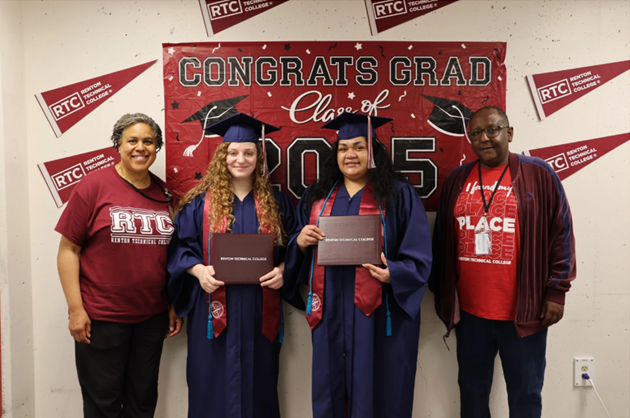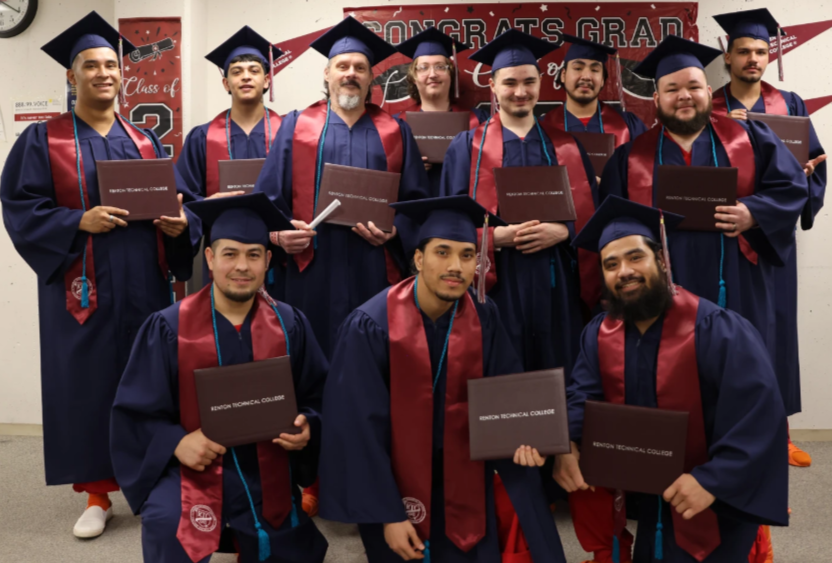The students donned caps and gowns, marched to “Pomp and Circumstance,” and delivered
speeches.
When they moved their graduation tassels from right to left, it was official: they
had earned their high school diploma.
This ceremony didn’t take place on a school campus, but inside a jail multipurpose room at the Maleng Regional Justice Center in Kent. In addition to educators from their alma mater, Renton Technical College, jail programs staff and top brass were on hand to wish them well.
“These walls don’t define who you are,” Cmdr. Mohamed Eltayeb told a group of men who were graduating.
Eleven men and two women received their diplomas in person at separate ceremonies inside the jail on June 18. The occasion was a major achievement not only for each individual grad, but also for a partnership between Renton Technical College and the Department of Adult and Juvenile Detention.
Unlike Seattle Public Schools, which continued their classes in secure detention after the COVID-19 pandemic, the GED equivalency program at the MRJC ended abruptly during the lockdown in March 2020.
Classes through Renton Technical College started up in October, and the third academic quarter wrapped up in June. There were five classes for men and one for women at the MRJC during the spring quarter. An online class also started this spring at the King County Correctional Facility in Seattle.
The original plan was to offer GED prep and testing, but those tests won’t be ready until later this year. Instead, students have been able to participate in a program called High School Plus, or HS+ for short.
While a GED offers students more flexibility, High School+ is a great option for older students with lots of life experience, but less in the way of academic achievement. Offered at all community and technical colleges in Washington, HS+ allows students to earn credit toward their diplomas. In addition to taking classes, students can earn credit for prior learning such as work experience, a driver’s license, parenting, getting a first aid certification or a work handler permit.
“Education changes things for people and having these opportunities while incarcerated has long been known to help reduce recidivism,” said Volunteer Coordinator Claire Makins, DAJD’s lead on the program. “For many students, this is the first time they have been successful in school. This success opens an alternative path to what they may have considered, including higher education and better job prospects. This encourages them to contribute back to their communities.”
Through mid-May, more than 100 students had attended at least one class, and more than half of them were still active.
Margarito Uriostegui, who recently won third place in a poetry contest for MRJC residents and earned the teachers’ award for Most Significant Progress, spoke candidly at the graduation ceremony.
“Let me be honest – if you would have told me I would be sitting here receiving my diploma a year ago, I would have told you you’re dreaming, but here I am,” said Uriostegui, 30. “I want to thank everyone who has ever believed in me and the ones who didn’t because they are what motivated me.”
Fellow graduate Julian Cibrian, 19, said he overcame struggles to make his family proud: “If I were paid for the amount of times I felt like putting the books down and throwing everything away and just quitting, I would be a billionaire, and that’s to say throughout my entire lifetime, not only just in jail, but there was always something that kept me pushing, and that was being able to have my graduation picture posted up in my mother’s home. As well as being able to be the best role model in a plot twist, I could be for my siblings and future kids.”
Two full-time teachers from Renton Technical College handle the classroom instruction. Students also can access online resources.
 Most know Rosemary Tanksley as “Ms. T.” She handles core subjects such as English,
math, science and social studies. Tanksley, pictured left with resident Marissa Pettit, resident Florence Esekielu,
and instructur David Zere.
Most know Rosemary Tanksley as “Ms. T.” She handles core subjects such as English,
math, science and social studies. Tanksley, pictured left with resident Marissa Pettit, resident Florence Esekielu,
and instructur David Zere.
David Zere works with students who need to gain English skills before they are ready to get a diploma. He also oversees the Prior Learning Assessment to gauge what skills students have learned outside the classroom as part of his HS+ class.
Tanksley calls herself “a Jill of all trades.” She’d taught just about everything between pre-school and middle school since starting her career as an educator in 2007. But stints at Bellevue elementary schools left her burned out and longing for something different.
She wasn’t very familiar with jails or prisons before she accepted the job at the
jail last year.
“This has been a straight up learning curve – it’s different from anything I’ve ever
experienced before,” she said.
Like all new employees in a jail setting, she had to learn to be on guard for manipulation by residents. She constantly reminds herself: Don’t get too comfortable.
Major Carmella Frazier addresses the women's graduating class.
Now that she’s settled in, she enjoys the challenges. How do you get older students to adhere to a schedule? Break them of bad habits? What kind of rewards can you give people inside the jail, when candy or gifts aren’t an option?
“I’ve found profound purpose in this position. It’s a good fit for me,” she said.
One of her students told her how he got fired from a job because he didn’t know how
to use a tape measure. Now she makes sure to impart this skill to all her students,
since so many of them work in construction.
To teach lab sciences, she got permission to use a bag, seed, dirt and water to grow small plants.
She tells her students: “This is an artificial environment and there’s growth – you can grow too.”
The Department of Adult and Juvenile Detention is grateful for the partnership with Renton Technical College for the High School+ and GED certificate programs. This includes Ali Cohen, Dean of College and Career Pathways at Renton Technical College, and Volunteer Coordinator Tom Helm, who is supporting the online classes at KCCF.
Story republished with permission from King County Department of Adult & Juvenile Detention and author Noah Haglund.
